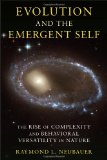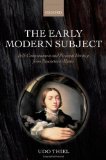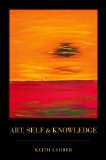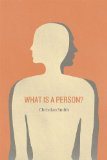December 7, 2011

Evolution and the Emergent Self: The Rise of Complexity and Behavioral Versatility in Nature by Raymond L. Neubauer (Columbia University Press, 2011)
(kindle ed.), (amazon.co.uk)
Product description from the publisher:
Evolution and the Emergent Self is an eloquent and evocative new synthesis that explores how the human species emerged from the cosmic dust. Lucidly presenting ideas about the rise of complexity in our genetic, neuronal, ecological, and ultimately cosmological settings, the author takes readers on a provocative tour of modern science’s quest to understand our place in nature and in our universe. Readers fascinated with “Big History” and drawn to examine big ideas will be challenged and enthralled by Raymond L. Neubauer’s ambitious narrative.
How did humans emerge from the cosmos and the pre-biotic Earth, and what mechanisms of biological, chemical, and physical sciences drove this increasingly complex process? Neubauer presents a view of nature that describes the rising complexity of life in terms of increasing information content, first in genes and then in brains. The evolution of the nervous system expanded the capacity of organisms to store information, making learning possible. In key chapters, the author portrays four species with high brain:body ratios—chimpanzees, elephants, ravens, and dolphins—showing how each species shares with humans the capacity for complex communication, elaborate social relationships, flexible behavior, tool use, and powers of abstraction. A large brain can have a hierarchical arrangement of circuits that facilitates higher levels of abstraction.
Neubauer describes this constellation of qualities as an emergent self, arguing that self-awareness is nascent in several species besides humans and that potential human characteristics are embedded in the evolutionary process and have emerged repeatedly in a variety of lineages on our planet. He ultimately demonstrates that human culture is not a unique offshoot of a language-specialized primate, but an analogue of fundamental mechanisms that organisms have used since the beginning of life on Earth to gather and process information in order to buffer themselves from fluctuations in the environment.
Neubauer also views these developments in a cosmic setting, detailing open thermodynamic systems that grow more complex as the energy flowing through them increases. Similar processes of increasing complexity can be found in the “self-organizing” structures of both living and nonliving forms. Recent evidence from astronomy indicates that planet formation may be nearly as frequent as star formation. Since life makes use of the elements commonly seeded into space by burning and expiring stars, it is reasonable to speculate that the evolution of life and intelligence that happened on our planet may be found across the universe.
See also: Author interview at Salon.com
Comments (0)
- human evolution,new books,self
November 16, 2011

The Early Modern Subject: Self-Consciousness and Personal Identity from Descartes to Hume by Udo Thiel (Oxford University Press, USA)
(amazon.co.uk)
Product description from the publisher:
The Early Modern Subject explores the understanding of self-consciousness and personal identity–two fundamental features of human subjectivity–as it developed in early modern philosophy. Udo Thiel presents a critical evaluation of these features as they were conceived in the seventeenth and eighteenth centuries. He explains the arguments of thinkers such as Descartes, Locke, Leibniz, Wolff, and Hume, as well as their early critics, followers, and other philosophical contemporaries, and situates them within their historical contexts. Interest in the issues of self-consciousness and personal identity is in many ways characteristic and even central to early modern thought, but Thiel argues here that this is an interest that continues to this day, in a form still strongly influenced by the conceptual frameworks of early modern thought. In this book he attempts to broaden the scope of the treatment of these issues considerably, covering more than a hundred years of philosophical debate in France, Britain, and Germany while remaining attentive to the details of the arguments under scrutiny and discussing alternative interpretations in many cases.
Google Books preview:
Comments (0)
- consciousness,new books,philosophy of mind,self
November 10, 2011

Art, Self and Knowledge by Keith Lehrer (Oxford University Press, USA, 2011)
(amazon.co.uk – Jan 2012)
Product description from the publisher:
Art can provide us with a sensory experience that provokes us to reconfigure how we think about our world and ourselves. Theories of art have often sought to find some feature of art that isolates it from the rest of experience. Keith Lehrer argues, in opposition, that art is connected, not isolated, from how we think and feel, represent and react. When art directs our attention to sensory exemplars in aesthetic experience of which we become conscious in a special way, it also shows us our autonomy as we represent ourselves and our world, ourselves in our world, and our world in ourselves. This form of representation, exemplar representation, uses the exemplar as a term of representation and exhibits the nature of the content it represents in terms of itself. It shows us both what our world is like and how we represent the world thereby revealing the nature of intentionality to us. Issues of general interest in philosophy such as knowledge, autonomy, rationality and self-trust enter the book along with more specifically aesthetic issues of formalism, expressionism, representation, artistic creativity and beauty. The author goes on to demonstrate how the connection between art and broader issues of feminism, globalization, collective wisdom, and death show us the connection between art, life, politics and the self.
Drawing from Hume, Reid, Goodman, Danto, Brand, Ismael and Lopes, Lehrer argues here that the artwork is a mentalized physical object engaging us philosophically with the content of exemplar experience. The exemplar representation of experience provoked by art ties art and science, mind and body, self and world, together in a dynamic loop, reconfiguring them all as it reconfigures art itself.
Google Books preview:
See also: Website for the book
Comments (0)
- culture,new books,self
October 18, 2011

What Is a Person?: Rethinking Humanity, Social Life, and the Moral Good from the Person Up by Christian Smith (University of Chicago Press, 2010) is only $4.75 for the Kindle edition (US). (Prices are subject to change at any time, so check before you click!)
Product description from the publisher:
What is a person? This fundamental question is a perennial concern of philosophers and theologians. But, Christian Smith here argues, it also lies at the center of the social scientist’s quest to interpret and explain social life. In this ambitious book, Smith presents a new model for social theory that does justice to the best of our humanistic visions of people, life, and society.
Finding much current thinking on personhood to be confusing or misleading, Smith finds inspiration in critical realism and personalism. Drawing on these ideas, he constructs a theory of personhood that forges a middle path between the extremes of positivist science and relativism. Smith then builds on the work of Pierre Bourdieu, Anthony Giddens, and William Sewell to demonstrate the importance of personhood to our understanding of social structures. From there he broadens his scope to consider how we can know what is good in personal and social life and what sociology can tell us about human rights and dignity.
Innovative, critical, and constructive, What Is a Person? offers an inspiring vision of a social science committed to pursuing causal explanations, interpretive understanding, and general knowledge in the service of truth and the moral good.

The paperback edition is due out on October 30.
Comments (0)
- new books,self
October 16, 2011

Meditating Selflessly: Practical Neural Zen by James H. Austin (MIT Press, 2011)
(amazon.co.uk – 4 Nov)
Product description from the publisher:
This is not the usual kind of self-help book. Indeed, its major premise heeds a Zen master’s advice to be less self-centered. Yes, it is “one more book of words about Zen,” as the author concedes, yet this book explains meditative practices from the perspective of a “neural Zen.” The latest findings in brain research inform its suggestions. In Meditating Selflessly, James Austin–Zen practitioner, neurologist, and author of three acclaimed books on Zen and neuroscience–guides readers toward that open awareness already awaiting them on the cushion and in the natural world. Austin offers concrete advice–often in a simplified question-and-answer format–about different ways to meditate. He clarifies both the concentrative and receptive styles of meditation. Having emphasized that top-down and bottom-up forms of attention are complementary, he then explains how long-term meditators can become increasingly selfless when they cultivate both styles of attention in a balanced manner. This, Austin explains, is because our networks of attention are normally engaged in an inverse, reciprocal, seesaw relationship with the different regions that represent our autobiographical self. Drawing widely from the exciting new field of contemplative neuroscience, Austin helps resolve an ancient paradox: why both insight wisdom and selflessness arise simultaneously during enlightened states of consciousness.
Comments (0)
- consciousness,meditation,new books,self








